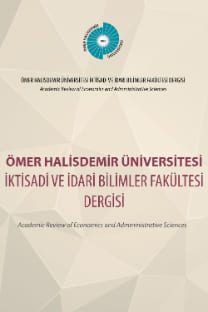Dolar/Euro Paritesinin Türkiye’nin İhracatına Etkisi: Ekonometrik Bir Analiz.
Türkiye ihracatını ağırlıklı olarak euro, ithalatını ağırlıklı olarak dolar ile yapmaktadır. Ayrıca ithalatının büyük bölümü hammaddelerden oluşurken ihracatında tüketim mallarının payı göreceli olarak daha fazladır. Böylece Türkiye dolar ile ithal ettiği hammaddeleri kullanarak ürettiği tüketim mallarını euro ile ihraç eden bir ülke konumundadır. Dış ticaretteki bu yapı dolar/euro paritesindeki değişmelerin Türkiye’nin ihracatını reel olarak etkilemesini gündeme getirmektedir. Euronun dolar karşısında değer kazanması, ithal girdiler yoluyla maliyetleri azaltarak, ihracatı teşvik edebilecek bir gelişmedir. Euronun dolar karşısında değer kaybetmesinin ise ithal girdiler yoluyla maliyetleri arttırarak ihracatı caydırması beklenebilir. Bu çalışmada dolar/euro paritesindeki değişmelerin Türkiye’nin ihracatını gerçekten etkileyip etkilemediği 2002:I-2010:II dönemine ilişkin üçer aylık verilerle araştırılmıştır. Sonuçta dolar/euro paritesindeki değişmelerin Türkiye’nin reel ihracatını hem uzun dönemde hem de kısa dönemde aynı yönlü olarak etkilediği bulgusuna ulaşılmıştır. Bu etki kısa dönemde zayıf iken uzun dönemde güçlenmektedir.
Anahtar Kelimeler:
Dolar/euro paritesi, ihracat, sınır testi, ARDL modeliJel kodu: F41, F31, F14
Dolar/Euro Paritesinin Türkiye’nin İhracatına Etkisi: Ekonometrik Bir Analiz.
Turkey performs its exports mostly based on Euros whereas its imports on US dollar. In addition, most of its imports is raw materials while the share of the consumer products is visibly higher in the exports. This makes Turkey a country that uses the imported raw materials in US currency and exports the final products on Euro. This structure in foreign trade points to the real impact of the changes in the dollar/euro parity in Turkey's exports. The valuation of euros against the dollar may promote exports by reducing the costs via imported inputs. The devaluation of the euros against dollar should have a discouraging impact on the exports by increasing the input costs. This study analyzes whether the changes in the euro/dollar parity have actually impacted upon Turkey's exports by focusing on three-month periods between 2002 and 2010. The study concludes that the changes in euro/dollar parity affect Turkey's real exports in both long and short terms. This impact is strong in short term and less visible in long run.
Keywords:
Dollar/euro parity, exports, bounds tets, ARDL modelJel code: F41, F31, F14,
___
- BERÜMENT, Hakan ve Nergiz DİNÇER (2005), “Denomination Composition of Trade and Trade Balance: Evidence from Turkey”, Applied Economics, 37 (10): 1177- 1191.
- DICKEY, David A. ve Wayne A. FULLER (1979), “Distribution of the Estimators for Autoregressive Time Series with a Unit Root”, Journal of the American Statistical Association, 74 (366): 427-431.
- DICKEY, David A. ve Wayne A. FULLER (1981), “Likelihood Ratio Statistics for Autoregressive Time Series with a Unit Root”, Econometrica, 49 (4): 1057-1072.
- ENGLE, Robert F. ve Clive W. J. GRANGER (1987), “Cointegration and Error Correction: Representation, Estimation and Testing”, Econometrica, 55 (2): 251-276.
- FULLER, Wayne A. (1976), Introduction to Statistical Time Series, John Wiley and Sons, New York.
- GRANGER, Clive W. J. ve Paul NEWBOLD (1974), “Spurious Regressions in Econometrics”, Journal of Econometrics, 2 (2): 111-120.
- GUJARATI, Damodar N. (1999), Temel Ekonometri, Çev.: Ümit ŞENESEN ve Gülay Günlük ŞENESEN, Literatür Yayınları, İstanbul.
- JOHANSEN, Soren (1988), “Statistical Analysis of Cointegration Vectors”, Journal of Economic Dynamics and Control, 12 (2-3): 231-254.
- JOHANSEN, Soren ve Katarina JUSELIUS (1990), “Maximum Likelihood Estimation and Inference on Cointegration with Applications to the Demand for Money”, Oxford Bulletin of Economics and Statistics, 52 (2): 169-210.
- KAHYAOĞLU, Hakan ve Utku UTKULU (2006), “Euro-Dolar Paritesindeki Oynaklığın İhracat Üzerine Etkisi: Türkiye Örneği”, İktisat, İşletme ve Finans, 21 (242): 114- 125.
- MACKINNON, James G. (1990), Critical Values for Cointegration Tests, University of California at San Diego Department of Economics Discussion Papers, No: 90-4.
- MACKINNON, James G. (2010), Critical Values for Cointegration Tests, Queen’s Economics Department Working Paper, No: 1227.
- MOHAMMAD, Sulaiman D. (2010), “The Euro-Dollar Exchange Rates and Pakistan Macroeconomics Dynamics”, European Journal of Scientific Research, 42 (1): 6- 15.
- PESARAN, M. Hashem; Yongcheol SHIN ve Richard J. SMITH (2001), “Bounds Testing Approaches to the Analysis of Level Relationships”, Journal of Applied Econometrics, 16 (3): 289-326.
- TÜİK (2008), Satınalma Gücü Paritesi, Sorularla İstatistikler Dizisi-4, Türkiye İstatistik Kurumu Matbaası, Ankara.
- YÜCEL, Mustafa Eray (2005), 3+1 Essays on the Turkish Economy, The Institute of Economics and Social Sciences of Bilkent University Unpublished Ph.D. Dissertation, Ankara.
- ISSN: 2564-6931
- Yayın Aralığı: Yılda 4 Sayı
- Başlangıç: 2008
- Yayıncı: NİĞDE ÖMER HALİSDEMİR ÜNİVERSİTESİ
Sayıdaki Diğer Makaleler
KALKINMA AJANSLARINDA İÇ DENETİM
Dolar/Euro Paritesinin Türkiye’nin İhracatına Etkisi: Ekonometrik Bir Analiz.
Küçük ve Orta Ölçekli İşletmelerde Üretim Stratejisi.
Hasan Kürşat Güleş Mevhibe TÜRKMEN
Bölgesel Kalkınma Farklılıklarının Giderilmesinde Bir Politika Aracı Olarak Kalkınma Ajansları.
Nihat İşik Duygu Baysal Onur CEYLAN
1997-2010 Dönemi Türk Bankacılık Sektörü Risk Analizi.
Kentsel Dönüşüm Faaliyetlerinin Çevresel Etik ve Sosyal Sorumluluk Açısından Değerlendirilmesi.
YÜKSEK ÖĞRETİMDE ÇEVRE EĞİTİMİ ALAN VE ALMAYAN ÖĞRENCİLERDE ÇEVRE BİLİNCİ: NİĞDE ÜNİVERSİTESİ ÖRNEĞİ
Selim Kiliç M. Emin İNAL, M. Emin İNAL
Could Poverty Be Turned Into Prosperıty and Poor Into Rich in Turkey’s Reality?
